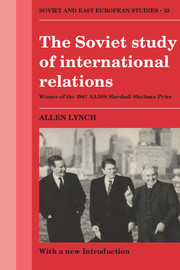Book contents
- Frontmatter
- Contents
- Foreword by Curt Gasteyger
- Acknowledgements
- INTRODUCTION: THE “ NEW POLITICAL THINKING” AND SOVIET FOREIGN POLICY: INTELLECTUAL ORIGINS AND POLITICAL CONSEQUENCES
- INTRODUCTION TO THE FIRST EDITION
- 1 THE BACKGROUND: MARX, LENIN, STALIN AND THE THEORY OF INTERNATIONAL RELATIONS
- 2 THE DEVELOPMENT OF SOVIET POLITICAL STUDIES
- 3 APPROACHES TO INTERNATIONAL RELATIONS
- 4 THE SYSTEMS APPROACH AND INTERNATIONAL RELATIONS
- 5 THE STRUCTURE OF THE INTERNATIONAL SYSTEM: THE SYSTEMS LEVEL
- 6 CRITICAL SUBSYSTEMS
- 7 THE SCIENTIFIC–TECHNICAL REVOLUTION AND THE CHANGING FACE OF INTERNATIONAL RELATIONS
- CONCLUSION
- Notes
- Bibliography
- Index
- SOVIET AND EAST EUROPEAN STUDIES
INTRODUCTION: THE “ NEW POLITICAL THINKING” AND SOVIET FOREIGN POLICY: INTELLECTUAL ORIGINS AND POLITICAL CONSEQUENCES
Published online by Cambridge University Press: 05 August 2011
- Frontmatter
- Contents
- Foreword by Curt Gasteyger
- Acknowledgements
- INTRODUCTION: THE “ NEW POLITICAL THINKING” AND SOVIET FOREIGN POLICY: INTELLECTUAL ORIGINS AND POLITICAL CONSEQUENCES
- INTRODUCTION TO THE FIRST EDITION
- 1 THE BACKGROUND: MARX, LENIN, STALIN AND THE THEORY OF INTERNATIONAL RELATIONS
- 2 THE DEVELOPMENT OF SOVIET POLITICAL STUDIES
- 3 APPROACHES TO INTERNATIONAL RELATIONS
- 4 THE SYSTEMS APPROACH AND INTERNATIONAL RELATIONS
- 5 THE STRUCTURE OF THE INTERNATIONAL SYSTEM: THE SYSTEMS LEVEL
- 6 CRITICAL SUBSYSTEMS
- 7 THE SCIENTIFIC–TECHNICAL REVOLUTION AND THE CHANGING FACE OF INTERNATIONAL RELATIONS
- CONCLUSION
- Notes
- Bibliography
- Index
- SOVIET AND EAST EUROPEAN STUDIES
Summary
A critical analysis of the past has been made to show that our foreign policy, too, did not escape dogmatic and subjective attitudes. It trailed behind fundamental changes that occurred in the world and missed chances to reduce tensions and enhance understanding among nations. In our bid for military-strategic parity we occasionally failed to use opportunities available to attain security for our nation by political means, and, as a result, allowed ourselves to be lured into an arms race, which could not but affect this country's social and economic progress and its standing on the international scene.
From Theses of the CPSU Central Committee for the 19th All-Union Party Conference, Pravda, May 27, 1988Events since March 1985 have made clear that Soviet General Secretary Mikhail Gorbachev seriously intends to carry out a thorough “restructuring” of the Soviet system in an effort to make the Soviet economy capable of effectively assimilating the opportunities offered by contemporary science, technology, and management technique. Gorbachev has repeatedly underscored the need for structural economic reform and, just as important, for sweeping social and even political reforms in order to sustain the economy over the long run. When it comes to Soviet foreign policy under Gorbachev, however, the picture has not always been so clear.
- Type
- Chapter
- Information
- The Soviet Study of International Relations , pp. xv - xlivPublisher: Cambridge University PressPrint publication year: 1987



